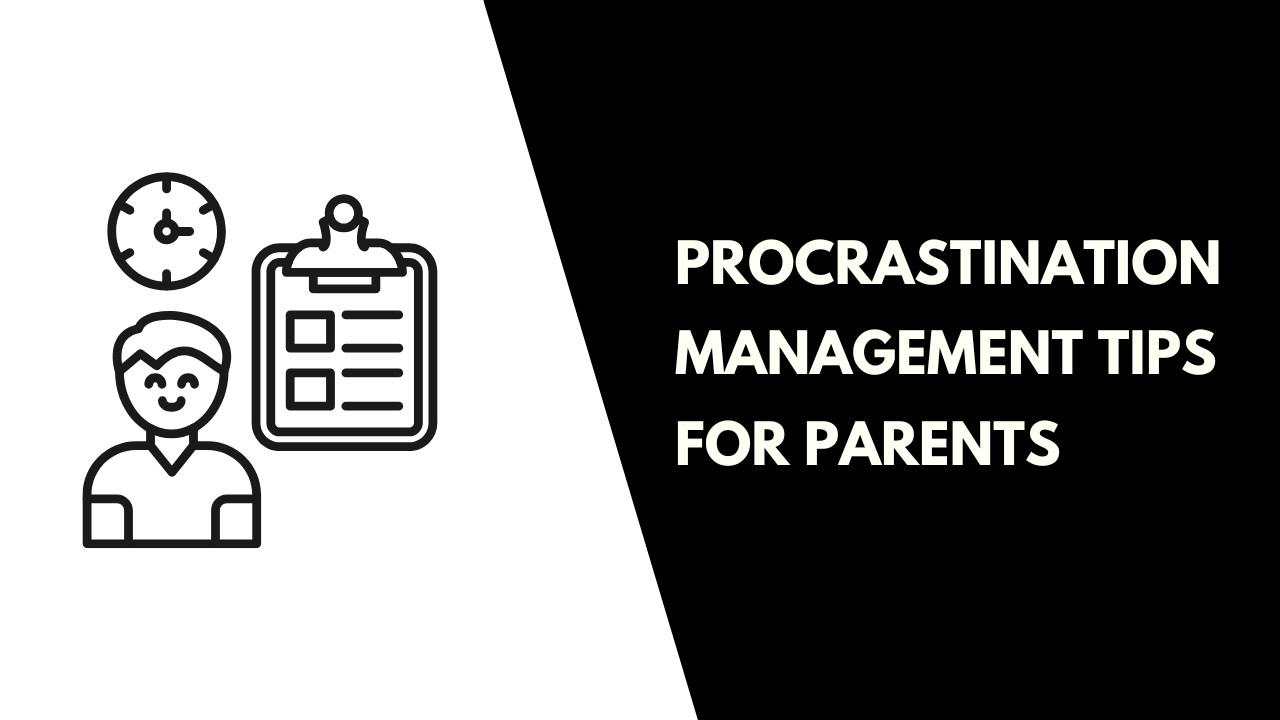Procrastination Management Tips for Parents
Procrastination Management Tips for Parents
Introduction
Have you ever found yourself putting off important parenting tasks, like helping your child with homework, scheduling a doctor’s appointment, or even planning quality family time? If so, you’re not alone. Parents juggle multiple responsibilities, and procrastination often sneaks in unnoticed.
Table of Contents
ToggleBut here’s the thing: procrastination isn’t just about laziness or lack of motivation—it’s often a response to stress, overwhelm, or decision fatigue. And the worst part? Kids observe and learn from their parents. If we struggle with procrastination, they might develop the same habits.
So, how can we stop procrastination as parents and teach our children better time management? This guide offers effective procrastination management strategies with real-life examples to help you take control.
Why Do Parents Procrastinate?
Before we jump into the solutions, let’s identify the reasons behind parental procrastination:
1. Overwhelm from Endless Tasks
Parents have a never-ending to-do list—work, household chores, school meetings, kids’ activities—the list goes on. When overwhelmed, it’s easier to push things to “later.”
Example:
Rita, a working mom, planned to start potty training her toddler. But between work deadlines and household chores, she kept postponing it. Every week, she told herself, “I’ll start next Monday.” Months passed, and potty training was still on hold.
2. Fear of Not Doing It Right
Many parents delay tasks because they fear making mistakes, especially when it comes to parenting decisions.
Example:
Ajay wanted to introduce his child to financial literacy but kept postponing the conversation. He was afraid he’d give the wrong advice, so he kept waiting for the “perfect moment.”
3. Exhaustion and Lack of Energy
Parenting is exhausting, and by the time you get some free time, all you want is to relax. As a result, important but non-urgent tasks get delayed.
Example:
After putting the kids to bed, Sarah planned to research good summer camps. But she was so tired that she scrolled social media instead, telling herself she’d do it tomorrow.
4. Instant Gratification Over Long-Term Benefits
Checking WhatsApp or watching Netflix is more immediately rewarding than decluttering the house or planning meals for the week. This preference for immediate pleasure leads to procrastination.
How to Stop Procrastination as a Parent
Now that we understand why we procrastinate, let’s explore how to overcome it with procrastination management strategies.
1. Use the Two-Minute Rule
If something takes less than two minutes to do, do it immediately. Small tasks pile up into overwhelming responsibilities if left undone.
Example:
Instead of postponing responding to your child’s teacher’s email, reply immediately if it takes just a minute.
2. Break Big Tasks into Smaller Steps
Large tasks feel intimidating, leading to procrastination. Breaking them into smaller steps makes them more manageable.
Example:
If you’ve been postponing organizing your child’s study space, don’t try to do it all at once. Start by decluttering one drawer today, then clear the desk tomorrow.
3. Set a Timer for 10 Minutes
If you dread a task, commit to working on it for just 10 minutes. Often, once you start, you’ll continue beyond the timer.
Example:
Raj kept delaying filling out school admission forms for his daughter. He finally set a 10-minute timer to get started, and before he knew it, he had completed half the application.
4. Schedule Parenting Tasks on Your Calendar
Don’t leave important parenting duties to “when I have time.” Block time on your calendar as you would for a work meeting.
Example:
Priya scheduled “homework check-in” at 7:00 PM every evening, treating it as a non-negotiable appointment. This helped her stop procrastination on school-related tasks.
5. Use the ‘Accountability Partner’ Trick
Tell your partner, friend, or even your child about a task you plan to complete. This external commitment will push you to follow through.
Example:
Amit told his wife that he’d enroll their son in a swimming class by Sunday. Having someone hold him accountable prevented further delay.
6. Reward Yourself for Completing Tasks
Motivate yourself with small rewards after completing tasks. This conditions your brain to associate productivity with positive reinforcement.
Example:
If you finally schedule that doctor’s appointment for your child, treat yourself to your favorite coffee or 30 minutes of uninterrupted relaxation time.
7. Set a Good Example for Your Kids
Children imitate their parents. If they see you procrastinating, they’re likely to do the same. Show them the value of time management through your actions.
Example:
If your child sees you completing chores without delay, they’ll be more likely to do their homework on time.
Overcoming Common Parenting Procrastination Scenarios
Let’s address some everyday situations where parents procrastinate and how to overcome them.
Scenario 1: Postponing Important Conversations
You’ve been meaning to talk to your child about internet safety, but you keep delaying it because it’s a tough conversation.
Solution:
Break the conversation into smaller topics and introduce them gradually. Set a reminder and commit to starting today.
Scenario 2: Avoiding Decluttering Kids’ Stuff
Toys, clothes, and school supplies keep piling up, but you don’t have the energy to sort them out.
Solution:
Dedicate just 15 minutes a day to decluttering one section at a time. Involve your child in the process.
Scenario 3: Procrastinating on Self-Care
You keep postponing exercise, doctor visits, or hobbies because you’re too busy with parenting duties.
Solution:
Prioritize self-care by scheduling it on your calendar. A healthy parent is a better parent.
How to Help Your Kids Stop Procrastination
As you improve your own procrastination management, help your kids develop good habits too.
1. Teach Time Management Skills
Encourage your child to use planners, to-do lists, and time-blocking techniques.
Example:
If your child struggles with completing homework on time, help them create a schedule with designated study periods.
2. Set Deadlines for Tasks
Kids often delay tasks without clear deadlines. Set specific timelines for completing chores or homework.
Example:
Instead of saying, “Clean your room soon,” say, “Please clean your room by 5 PM today.”
3. Make Tasks Fun and Engaging
Children are more likely to complete tasks if they enjoy them. Turn chores into games or set up a reward system.
Example:
Use a timer and challenge your child to complete their homework before it runs out.
4. Encourage a ‘Do It Now’ Attitude
Teach children the value of taking immediate action instead of delaying tasks.
Example:
If your child leaves their backpack in the hallway instead of putting it away, encourage them to fix it immediately.
Final Thoughts
Parental procrastination is common, but with effective procrastination management, you can stop procrastination, be more productive, and set a great example for your children.
By implementing simple habits like breaking tasks into smaller steps, scheduling important duties, and using accountability tricks, you can overcome procrastination and create a more organized and stress-free parenting experience.
Remember, every small step you take toward overcoming procrastination makes a difference—not just for you but for your children too. Start today, and set the foundation for a more productive and fulfilling parenting journey! 🚀
“Stop postponing your dreams! From Delay to Done is your ultimate guide to conquering procrastination. Grab your copy today on Amazon!






